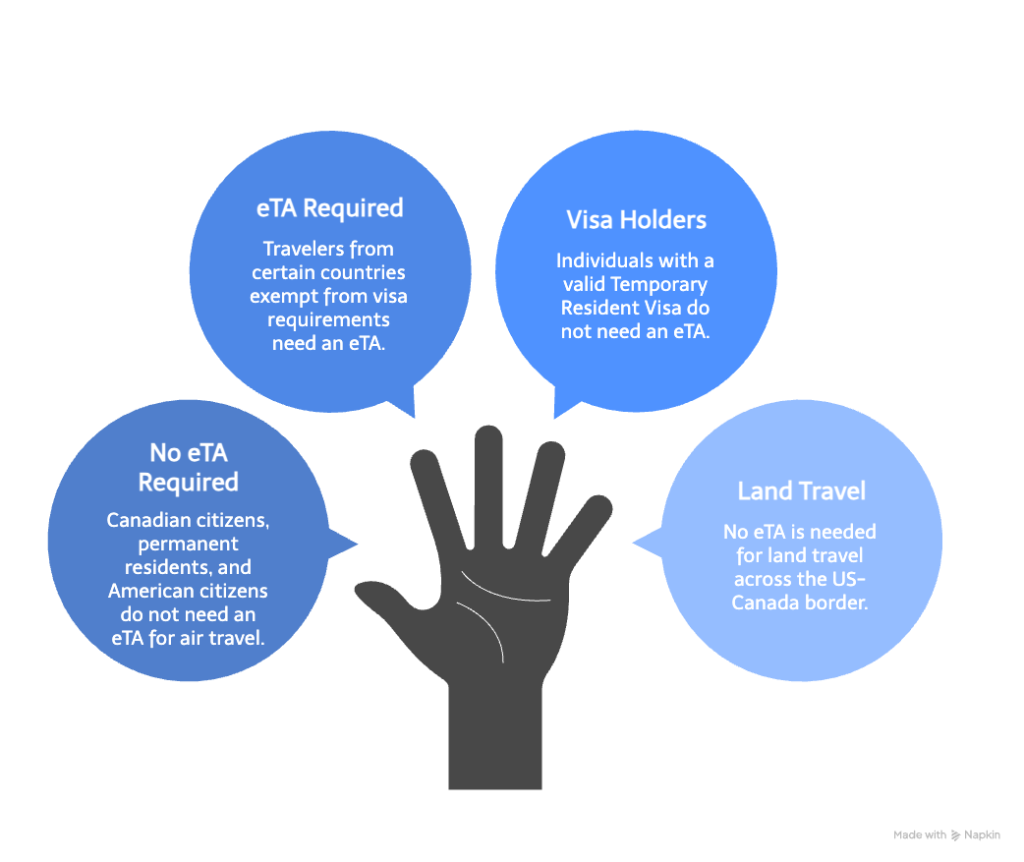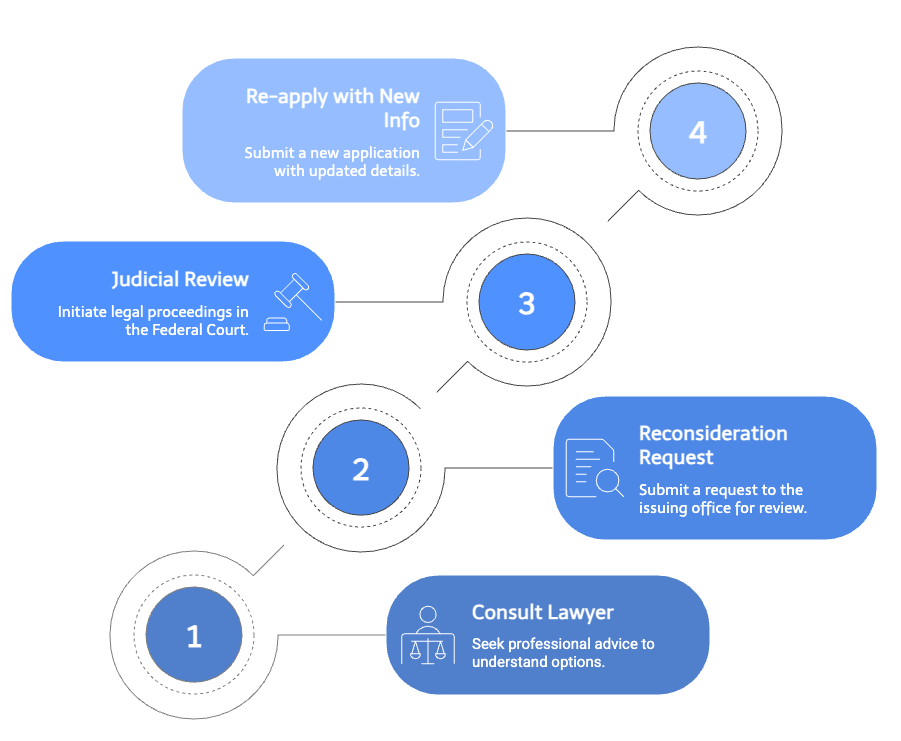Apply for Electronic Travel Authorization (eTA) to Canada
Home » Canadian Immigration Services » Temporary Residency In Canada » Electronic Travel Authorization (eTA)
Home » Canadian Immigration Services » Temporary Residency In Canada » Electronic Travel Authorization (eTA)
What is Electronic Travel Authorization (eTA)
An Electronic Travel Authorization (eTA) is a travel permit that authorizes certain persons, who are not Canadian citizens or permanent residents, to fly into one of Canada’s airports.
An eTA does not authorize you to stay in Canada. Having an eTA does not mean that you will be permitted entry.
Who needs an eTA to travel to Canada?
An eTA is required by persons from certain countries who are exempt from the requirement of obtaining a visa prior to seeking admission into Canada.
Canadian Citizens and permanent residents do not need an eTA to fly to Canada. American citizens do not require an eTA to fly to Canada. An eTA is not required for land travel, such as driving or walking across the border between the United States and Canada through a designated port of entry.
An eTA is not required for persons who already possess a valid Temporary Resident Visa for Canada.
Your entry is determined by an immigration officer of the Canada Border Services Agency (CBSA) at the time you arrive at your port of entry.
The CBSA officer may assess your eligibility for entry and admissibility. If you are found to be eligible and admissible, the CBSA will determine the appropriate maximum length of time you may be allowed to remain in Canada and the terms and conditions of your stay.
These terms and conditions may include: your authorization to visit certain persons, businesses and institutions, work, study or engage in other activities. They may also restrict your location of work or study, occupation or course, program or level of study, employer or institution, or any other such terms as may be authorized by Canada’s immigration laws or be reasonable.
Where do I apply for eTA Canada?
Applications for Canadian eTA must be made to the Government. They can be submitted on-line to Immigration, Refugees and Citizenship Canada (IRCC).
Do I need an eTA to travel to Canada?

How long does it take for an eTA application to be approved?
Processing times typically take no longer than 5 business days. However, they can be as quick as 20 minutes.
All eTA applications are initially subject to automated processing. If a flag or issue is detected or encountered on by the automated processing system, a notification will be delivered to you requesting further information or documentation.
The deadline to submit additionally requested information or documentation is usually very short – sometimes as little as 24 hours. Applications for eTAs that have been flagged may be examined by a visa application processing officer.
How much does it cost to apply for eTA to Canada?
The government application fee for an eTA costs $7.00 CAD per applicant. There may also be government application fees for certain incidental eTA application services, such as biometrics, employer compliance, or temporary foreign worker labour market impact assessments.
Further, some applicants may be expected to pay fees for required documentation or examinations, such as immigration medical examinations, police criminal records reports, or other records or reports.
Who can apply for eTA Canada
Persons interested in applying for an eTA for Canada may do so on-line to Immigration, Refugees and Citizenship Canada. Persons must complete the required web-form questionnaire and submit all requested documentation in order for their eTA application to be considered.
eTA applications can be found incomplete or be refused if not all of these items are completed or submitted.
Am I eligible to apply for eTA Canada?
In order to determine your eligibility, you must be a citizen of a country that is exempt from the requirement of needing a visa prior to seeking entry into Canada.
The automated screening system will examine your answers to the eTA application web-form questionnaire to determine whether your answers have raised any concerns with respect to the purpose of your trip or admissibility.
Furthermore, your information may be compared to a database of information shared by the Government with other foreign governments, including the United States of America, member countries of the North Atlantic Treaty Organization (NATO), member states of the European Union, Interpol, Australia, New Zealand or other countries with which Canada has information sharing security agreements.
Almost any visa-exempt foreign national can apply for eTA Canada. However, there are some exceptions, including persons who have been statutorily barred from applying, such as persons who recently made a refugee claim and are either awaiting a decision or were recently refused, persons who are required by the Immigration and Refugee Protection Act (IRPA) to apply for and obtain Authorization to Return to Canada (ARC) before applying for an eTA, or persons who have been found to have misrepresented on a prior application in the past 5 years.
What documents do I need to apply for an eTA?
Generally, all applicants require a valid passport or travel document that will be valid for the entire period of the intended temporary stay in Canada.
Other required documentation will be dependent on the type or class of temporary residency for which you are applying, your country of origin or permanent residence, or the local visa office or VAC requirements.
Supporting documentation is typically not initially provided electronically through the eTA application process. Rather, it may be requested by a processing officer after submitting the application or by an immigration officer of the Canada Border Services Agency (CBSA) at your airport of entry into Canada.
Requested supporting documentation may include: letters of invitation from Canadian citizens, businesses or institutions, proof of financial ability to support your stay and its purpose, such as bank account balance records, proof of employment, proof of a job offer, proof of studies, proof of acceptance or admittance into a program of study, education records, work history records, national identification cards, proof of property ownership in your country of origin or permanent residence, proof of family or other close relations in your country of origin or permanent residence, or other proof that you will comply with the temporary terms and conditions of your stay and the meet eligibility parameters of your type or class of admission.
Additionally, applicants may also be required to provide biometrics, including fingerprinting and retinal eye scans, medical examination reports or police records checks.
Other documents may also be requested by the visa officer or CBSA officer.
The list of documentation noted here is not intended to be exhaustive. It is recommended that you consult the document checklist available on the website of Immigration, Refugees and Citizenship Canada and with an immigration lawyer to determine what documents you may need to apply for eTA Canada.
Failure to provide all required documentation or information may result in the refusal of your eTA application, a finding of not being truthful or forthright, a finding of misrepresentation, or another negative finding that may limit your ability to apply for eTA Canada in the future.
I was refused an ETA. Can I appeal the decision or apply again?
It is recommended that you consult with an immigration lawyer if you have been refused or denied an eTA to Canada.
Appealing a refusal:
An application for an eTA can be appealed or contested in at least two ways: by submitting a request for reconsideration to the Case Processing Centre office or visa office, or by initiating an Application for Leave and for Judicial Review (JR) in the Federal Court of Canada (FCC).
Application for Leave and for Judicial Review:
If the refusal decision was made outside of Canada, such as by a visa office outside of Canada, an Application for JR must usually be made within 60 days of receipt of the decision.
If the refusal decision was made inside of Canada, such as by a Case Processing Centre office, an Application for JR must usually be made within 15 days of receipt of the decision.
Reconsideration request:
A request for reconsideration must usually be made directly to the Case Processing Centre office or visa office which refused the application or to Case Management Branch and must be made shortly after you receive the refusal decision.
Delays in submitting a request for reconsideration may result in the request being ignored or the documentation upon which the decision was based being archived or destroyed.
Furthermore, requests for reconsideration made after a long passage of time may result in the presumption of a change in circumstances and the information or documentation which was submitted may no longer be considered reliable or indicative of a person’s eligibility for the eTA.
Re-applying for an eTA:
Persons who have been refused an etA can also typically apply again with new or additional documentation or information at any time. There is typically no waiting period required by law.
However, there are some exceptions. Persons who have been found to have misrepresented are barred from applying for an eTA for 5 years.
Persons who have been found to have committed certain violations of the Immigration and Refugee Protection Act (IRPA) may be required to apply for and obtain Authorization to Return to Canada (ARC) before they may be permitted to apply for eTA Canada. Persons who have been found criminally inadmissible to Canada may have to apply for and obtain Criminal Rehabilitation before they may be permitted to apply for an eTA to Canada.
Steps to Address eTA Refusal

Do I need an eTA if I have a valid Visitor Record, Work Permit, Study Permit, or Temporary Resident Permit?
A Visitor Record, Work Permit, Study Permit, or Temporary Resident Permit is not valid for travel to Canada. In most cases, persons who are exempt from the requirement of needing a visa to travel must also have a valid eTA to fly to Canada.
Some exceptions include American citizens, persons who are travelling to Canada by land or sea, persons who possess a valid Temporary Resident Visa (TRV or Visa), or persons who have valid temporary residency status and have travelled solely to the United States from Canada and are returning to Canada within the period initially authorized for their stay.
Can you apply for eTA to Canada for me?
Mandelbaum Immigration Lawyers can apply for an eTA to Canada for you.
Simply provide us with your name, email address and phone number by clicking the button bellow, and our office will contact you to arrange a consultation with a lawyer.
